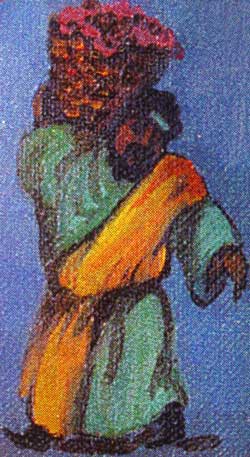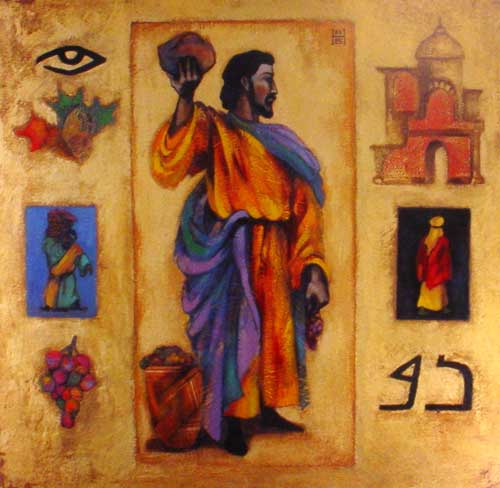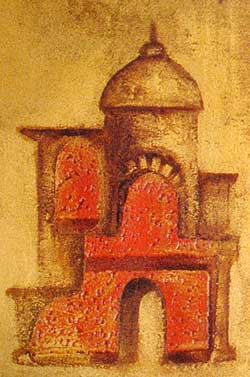


"The Tenants in the Vineyard" by Kazakhstan Artist Nelly Bube.



The suggested text does not include verses 44-46. We have included these verses for a better understanding of the text.
The scene is Jerusalem on the Tuesday before Jesus' crucifixion and death. The text is paralleled at Luke 20:9-19 and Mark 12:1-12. Luke is abbreviated, in comparison with Matthew and Mark. But all three say essentially the same thing and do not contradict each other. Jesus addresses the people but His words are aimed especially at the members of the Sanhedrin who hear what He says.
On the relationship between verses 28-32 and 33-46.
Ylvisaker: There is an intimate logical interrelation between this and the preceding parable. Jesus again assails specifically the spiritual leadership of the people. But the parables are also markedly dissimilar. The parable of the wicked husbandmen has a broader import, is more pointed and incisive, pictures the past, present, and future of Israel in more striking colors, and foreshadows more unmistakably the judgment that portends. This parable shows how the people, deluded and deceived by their leaders, are gradually perverted, how their obstinacy of spirit becomes more a matter of the will, their trust in themselves more blind, and their persistent abuse of God's grace and His gifts more and more mature for the judgment. In the preceding parable, emphasis is placed upon the point that the self-satisfied leaders are in more deplorable straits than even publicans and harlots in their relation to the Kingdom. Here we are informed that the 'leaders' as Representatives of the entire nation, and therefore the people itself shall be excluded in such a way that the Kingdom shall be taken from them, and that others who are more worthy shall obtain the inheritance. In the parable of the two sons, Jesus describes the attitude to the Forerunner, in this parable, to Himself as the Son who had been sent of the Father. Here their wickedness becomes open rebellion.
Lenski: The first (parable) presents likely imagery, the second imagery that never did and never will happen. A man may have two sons that act like the two presented in the parable; but no owner of a vineyard who had a servant killed would then send other servants also to be killed and on top of that his own son, only to have him killed also. . . . The reason for this astounding imagery is that in his long suffering God does act, in fact, did act in the way here depicted. There is no imagery within the experience of men that can picture the amazing grace and patience of God. . . . With this unheard of imagery Jesus pictures the unheard of wickedness of these Jewish leaders who murdered not only the prophets sent for salvation but were now about to murder God's own Son.
The imagery of Matthew 21:33-41 is very similar to that of Isaiah 5:1-7. What they have in common: The vineyard, a tower, a wine press. God had done absolutely everything for Israel. God is patient and long-suffering. Wherein they differ: Isaiah 5:1-7 speaks of all of Israel whereas Matthew 21:33-41 stresses Israel's leadership. The former stresses Israel's fruitlessness whereas the latter stresses the rebellious attitude of Israel's leaders.
"Landowner" is likely addressed not only to the people but also the Sanhedrists who were still present. Almost unanimously our versions translate as "landowner." The vineyard is the Old Testament theocracy. The hedge is the Law and the covenant. It surrounded Israel and separated the Jew from the Gentile.
Fahling: The wine-press is the Temple with its rituals and sacrifices foreshadowing the supreme sacrifice of the promised Messiah for the sins of all mankind.
In other words, the place where the fruits were concentrated. Ylvisaker and Fahling agree on the tower: "A tower of civic order or of prophecy was constructed from which the prophetic watchmen could study the approach of Messianic times. Micah 7:4; Isaiah 52:8; 62:6." Bengel interprets the wine press as Jerusalem and the tower as the Temple. Lenski says: "The tower was built for watchmen and at the same time as a storehouse." These are not serious differences of interpretation. The point is that the vineyard lacked absolutely nothing.
Our versions translate either "leased" or "rented." The point is that God alone owned it. He loaned it to the farmers. Renting, in application, does not mean that God removed Himself or that He did not care, but rather that He entrusted everything to Israel as responsible recipients of the covenant. He trusted them.
At harvest time he sent servants with a specific commission. "Servants" means God's special emissaries, especially the Prophets. Note that the text speaks of "his" fruits, the owner's fruits. The parable does not speak of share-croppers, as some translations state or intimate. All the fruits are God's. The fruits, in application, denote contrition, faith and fruits thereof. In a word, spiritual obedience. He expected that.
This verse denotes the opposite of the Lord's will. They were sent to receive the fruits. But the workers violently take those sent.
Bengel: An ascending climax, in which the third degree is an atrocious species of the second.
True. Only blasphemers were to be stoned. They treat them as blasphemers!
Bengel: Superior, certainly in number, and without doubt also in virtue, dignity, etc. The increase of calling is no sign of a more faithful people.
The period of "the sent servants" lasted from Moses, the first prophet, until the Baptist, the last prophet, 1500 B.C. to the time of Christ, fifteen centuries!! The heaviest concentration of prophets came from about 900 B.C. til about 600 B.C., thirteen in all, from Elijah to Obadiah. The more wicked Israel became, the more prophets were sent. During the exile there were two, Daniel and Ezekiel, 600-570 B.C. After the exile there were three, from 520-400 B.C. And finally there was John the Baptist.
The words "beat, killed, stoned" are figurative for a violent, hateful, rebellious attitude, though some were actually killed. The word "the same way" says much. It was a constant attitude of the religous leaders.
No ordinary landowner would have allowed this. The patience of God is pictured in unusual imagery, especially in this verse "last of all." The meaning of "them -- they" is obvious to us, as it must have been to Jesus' hearers.
"Respect" is literally "turn to" is translated by our versions with "respect." He was the greatest of those sent by God.
Lenski: The prophets were God's slave-servants as a result of being sent; Jesus is sent as a result of being the Son. In the one case the mission makes man, in the other the Man makes the mission.
By the way, compare Hebrews 1:1.2. Jesus, the incarnate Christ, the Creator of all, the Heir of all, spoke the final Word. He came because of God's boundless grace, love and mercy.
They knew precisely who He was, though they denied Him. They sinned against better knowledge. It was unanimous. They knew the heir. Christ is truly the Heir of all things. Through the Savior they already were heirs. But they rejected that. The point is that they wanted to hold Israel on their own terms.
Ylvisaker:They plot against the son in the fear that he will wrest from them the authority they have usurped.
Bengel: They might have known Him to be the Heir, and yet they opposed His right.
Lenski: They killed Jesus because they feared to lose their own positions.
Compare John 11:48. The Sanhedrists were horrified at the thought of people believing in Jesus.
There is nothing quite so irrational and diabolical as the violence of those who reject God, His Word and His Son. Compare the treatment of the Apostles, especially Paul, in Acts. In application "the vineyard" means the Old Testament theocracy, God's covenant with Israel. The religious leaders actually threw Jesus out of the theocracy, that is, on their own terms. They violently disowned Him as unworthy to belong to Israel.
The verse reminds us of Peter's words (Acts 3:15): "You killed the Prince of Life."
Who are the "they replied." In the parallel account (Luke 20:9) we are told that this parable was addressed "the people." Did the Sanhedrists hear it? At the conclusion of this series of parables all three Synoptics tell us that the religious leaders left to plot against Him and continued their attempt to catch Him in His words (Matthew 22:15; Mark 12:13; Luke 20:20). Furthermore, Matthew 21:23 leaves us with the definite impression that the Sanhedrists did hear this.
Finally, this parable (Matthew 21:33-41) is directed at leaders of the Jews. This implies that Sanhedrists heard it. Mark and Luke inform us that Jesus Himself answered His own question. Matthew says the people (they) answered the question. The Gospels supplement each other. Both are true and are not contradictory. They answer: "The evil ones in an evil way he will destroy." In other words, judgment will be commensurate with the evil attitude and actions.
Note that "give" is from the same stem of the verb used in verse 33, which denotes God's gracious giving. He will graciously give the vineyard, the kingdom, to other land workers, the Gentiles. The remainder of this sentence is easy to interpret.
The translations are interesting:
In this verse Jesus is speaking about two things:
He foretells, in the second part of the verse, that those to whom the vineyard, the Kingdom, is given, will render the fruits to Him when the opportune time for those fruits comes. In or words, phrase is temporal. In each generation since Pentecost this has happened. It is remarkable that this phrase does not occur from verse 33 to 39. That does not mean, of course, that there were no believers among the Old Covenant people. Hebrews 11 clearly says that there were.
A question requiring the answer "yes." They had read it at Psalm 118:22, a Messianic prophecy.
Fahling: From Jewish lips came the admission that, if God would take His Word and grace from them and give them to the Gentiles, this punishment would be well deserved. As a matter of fact, this very thing, as Jesus points out, had been prophesied in Scripture (Psalm 118:22). This quotation contains the germ of another parable in which the rejected heir becomes the rejected stone of the builders, only, however, in turn eventually to become the accepted Cornerstone of God.
The building, made of stone, is the New Testament Church. Christ is the stone. The builders are the Jewish authorities. They rejected the stone after close inspection. They threw it out as unfit for the building. But, the rejected stone proved to be the most important stone, the corner or key-stone on which the whole building depends. This was from the Lord. The Lord allowed the rejection but this is wonderful to our eyes. God turned evil into good. The thought is akin to that of Joseph at Genesis 50:20. By being cursed, Jesus accomplished universal blessing. Galatians 3:13. This is truly wonderful in our eyes.
"Therefore" in view of what is said both in parable and in prophecy. "I tell you" denotes the divine authority of Jesus. "The Kingdom of God" is the preaching of the gracious Gospel of Jesus Christ. The Jewish authorities rejected it by rejecting the Christ and throwing Him out as unworthy of membership in the Kingdom. And so "it will be taken from you," you rejecters.
The Kingdom is ever a gift, nothing but that. "A people" should not be limited to the Gentiles. It is the New Testament Church made up of believers, both among Jews and Gentiles.
What are the fruits? Those of contrition, repentance and the fruits which flow there from.
This verse is bracketed in the Greek text but it is well-attested in the manuscripts. It is surely textual. It is omitted only by RSV, JB and NEB.
This verse is starkest Law. It applies to all rejecters, be they Jews or Gentiles.
Fahling: Against those who oppose Christ a general and an individual judgment is pronounced. As applied to the nation (first part) and as applied to individuals (second part). Look at Luke 2:34.
Ylvisaker treats it differently.
Ylvisaker: In the first metaphor, the stone is represented as lying in the road. Israel and many others fall upon it, inasmuch as they take offense at the lowly form of Christ (Isaiah 8:14.15) and are, as a consequence, broken, crushed, and scattered. In the second figure of speech, the stone is pictured as falling precipitously from a building or a mountain (Daniel 2:45). This is a prefiguration of Christ's coming to judgment. Then He shall crush His enemies.
We do not think that these interpretations violate each other.
That the Sanhedrists heard the parables is clear. "He was speaking" about them.
The translations treat the syntax of this verse variously. We prefer that of JB: "But though they would have liked to arrest him they were afraid of the crowds, who looked on him as a prophet." The unbeliever is filled with fear of mere men. He rejects a gracious God and lives in fear of men.